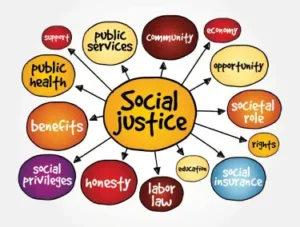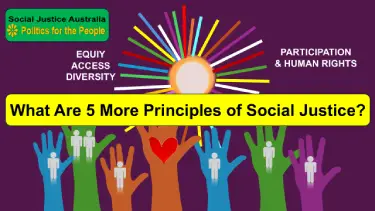Description: Principles of Social Justice
Discover 5 more principles of social justice—equity, access, participation, diversity, and human rights—and how Australia can use its monetary sovereignty to ensure fairness.
Introduction: Understanding the Core of Social Justice
In today’s rapidly changing world, social justice plays a crucial role in shaping ethical, inclusive societies. From ensuring fair access to opportunities to safeguarding human rights, understanding the 5 core principles of social justice is essential for individuals and governments alike. However, the struggle for fairness is ongoing, especially in Australia, where neoliberal policies have eroded key social systems.
As we explore these principles of social justice, we also consider how Australia’s monetary sovereignty offers a unique opportunity to create a more compassionate and just society. In this guide, we’ll break down each principle, give real-world examples, and offer actionable solutions that address the challenges facing social justice today.
Social Inequality and the Need for Justice
Despite advancements in technology and policy, vast inequities still exist across Australia and the world. Neoliberal policies have stripped vital social services, widened the wealth gap, and perpetuated systemic discrimination, making it difficult for many citizens to thrive. This inequity has far-reaching consequences, from homelessness to underfunded healthcare, all worsening societal divides. Understanding the principles of social justice is critical to confronting these issues and fostering a society where fairness and equality are paramount.
The 5 Principles of Social Justice
1. Equity: Ensuring Fairness for All
Definition: Equity refers to fairness in treatment, opportunities, and resource distribution. Unlike equality, which assumes everyone starts from the same place, equity acknowledges unique needs and works to end barriers that prevent marginalized communities from accessing opportunities.
Real-World Example: In Australia, income inequality is a pressing issue. According to the *Australian Bureau of Statistics*, the top 20% of households own 63% of total wealth, while the bottom 20% hold just 1%. This disparity underscores the need for policies that promote financial equity through progressive taxation, better wages, and investment in public services.
Solution: To achieve greater equity, Australia’s government must use its monetary sovereignty by increasing public investments in housing, healthcare, and education, ensuring every citizen can thrive. Reforming welfare policies and redirecting funds from corporate subsidies to social programs are key steps towards a fairer society.
2. Access: Removing Barriers to Resources and Opportunities
Definition: Access involves ensuring that all individuals can reach essential services, such as healthcare, education, housing, and employment. When access is limited by factors such as geography, socioeconomic status, or systemic discrimination, it perpetuates injustice.
Real-World Example: In rural areas of Australia, access to healthcare is still a significant challenge. Many residents must travel long distances for basic medical services, and the shortage of healthcare professionals worsens this issue. Similarly, Indigenous communities often lack access to quality education and employment opportunities due to systemic disadvantages.
Solution: Australia’s government can use its fiscal ability to invest in regional infrastructure, ensuring that essential services like healthcare and education are accessible to everyone, regardless of location. Expanding public transport, improving telehealth services, and investing in regional schools can bridge these gaps.
3. Participation: Empowering All to Have a Voice
Definition: Participation ensures that everyone has a say in decisions that affect their lives. It involves engaging citizens in political, economic, and social processes and ensuring their voices are heard, particularly for historically marginalized groups.
Real-World Example: Voter turnout in some disadvantaged communities is still low, often due to disenfranchisement or lack of engagement. A study by the *Australian Electoral Commission* showed that voter turnout among Indigenous Australians was significantly lower than the national average, reflecting systemic barriers to participation in democracy.
Solution: Encouraging participation requires both education and access to democratic processes. Expanding voter education initiatives, lowering barriers to voter registration, and introducing policies that foster inclusivity in the decision-making process are crucial steps. Governments can also offer financial support for community-driven initiatives that amplify marginalized voices.
4. Diversity: Valuing and Respecting Differences
Definition: Diversity means appreciating the unique identities, cultures, and perspectives that diverse groups bring to society. It promotes inclusivity and aims to protect individuals from discrimination based on race, gender, ethnicity, sexual orientation, or religion.
Real-World Example: In Australia, racial discrimination is still a persistent issue, particularly against Indigenous Australians, who continue to face higher rates of incarceration, unemployment, and health disparities. The lack of representation in leadership positions further marginalizes these communities.
Solution: To embrace diversity, Australia must implement stronger anti-discrimination policies and ensure representation of diverse groups in decision-making roles. By fostering inclusivity in workplaces, schools, and public life, and ensuring these protections are upheld, society can receive help from the diverse perspectives that enrich our communities.
5. Human Rights: Protecting the Rights of All Individuals
Definition: Human rights are the basic freedoms and protections that all individuals are entitled to, including the right to life, liberty, and security. Social justice demands the protection of these rights for everyone, regardless of status or background.
Real-World Example: In Australia, the treatment of asylum seekers and refugees has raised significant human rights concerns. Detention centres, particularly offshore, have been criticized by international organizations like the *United Nations*, which has highlighted the harsh conditions and indefinite detention faced by many seeking refuge.
Solution: Protecting human rights requires a comprehensive overhaul of current policies. This includes closing offshore detention centres, implementing fair asylum processes, and ensuring that Australia follows international human rights treaties. Domestically, improving the protection of citizens’ rights, such as addressing gender inequality and ensuring fair treatment for workers, is essential.
The Consequences of Ignoring Social Justice
When we do not address these five principles, the consequences are stark: increasing inequality, political disenfranchisement, and social unrest. The erosion of social safety nets, the widening wealth gap, and continued discrimination undermine the fabric of Australian society. The question we face is not whether we can afford to implement policies that promote equity, access, participation, diversity, and human rights—but whether we can afford not to.
Harnessing Australia’s Monetary Sovereignty for Social Justice
Australia’s unique position as a currency issuer means that it has the fiscal ability to address social injustice without the constraints that affect currency users. By focusing on using its monetary sovereignty to directly invest in public services, Australia can end poverty, reduce inequality, and ensure that the principles of social justice are embedded into every policy decision. Some actionable solutions include:
– Expanding Public Housing: The government can fund and build affordable housing to reduce homelessness and ensure fair living conditions.
– Universal Healthcare Expansion: Strengthening Medicare to cover all necessary treatments, including mental health services, and ensuring access to all.
– Free Education: Fully fund public education, including tertiary education, to give equal opportunities to all Australians, regardless of their background.
Summary: A Path Toward a Just Society

Social justice is not merely an ideal but a necessary framework for creating a fairer society. By understanding and implementing the five principles of social justice — equity, access, participation, diversity, and human rights—Australia can take meaningful steps toward an inclusive future. With its monetary sovereignty, the Australian government has the tools to make these changes a reality, ensuring that every citizen can thrive.
True social justice in Australia will only be realized when the government is held accountable to these principles, and when public money is directed towards public welfare rather than corporate interests.
Question for Readers
How do you think Australia should address the current inequalities in society? What actions would you like to see the government take?
Call to Action:
We encourage you to share this article with your network and join the conversation on social justice. Visit our “Reader Feedback” page. Let us know how our content has inspired you. Submit your testimonial and help shape the conversation today!

